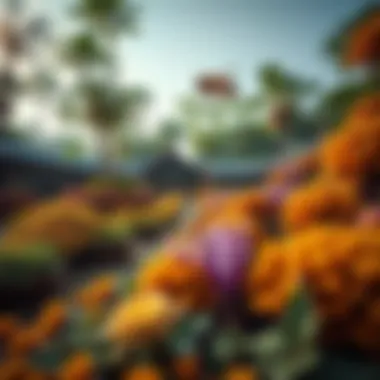Hatta Honey Bee Garden: Biodiversity and Sustainability


Intro
Nestled in the picturesque landscapes of Hatta, the Honey Bee Garden is not just a location, but a vision brought to life. This garden plays a pivotal role in highlighting biodiversity and the essential work of bees in our ecosystem. As urbanization seeps into natural spaces, initiatives like this become a sanctuary for pollinators and an educational hub for the community.
As visitors stroll through the gardens, they engage with various species of bees and learn about the challenges these vital creatures face. More than a mere outing, it’s an eye-opener that stresses the importance of conservation. By nurturing bees, the garden supports sustainable agricultural practices, thereby contributing to a healthier environment.
With Dubai's booming development, the intersection of nature and real estate is increasingly relevant. The Hatta Honey Bee Garden showcases how ecological merits can enhance property investment opportunities while also catering to lifestyle enthusiasts who prioritize sanctuaries of nature in their choices.
Prelims to Hatta Honey Bee Garden
The Hatta Honey Bee Garden stands as a testament to the significant role that biodiversity plays in our ecosystems. This unique space not only serves as a habitat for various bee species, but it also embodies sustainable agricultural practices that are increasingly crucial in today's world. Understanding the significance of such gardens contributes to broader themes of conservation, environmental responsibility, and community engagement.
The importance of the Hatta Honey Bee Garden is multifaceted. First and foremost, it highlights the essential role bees play in pollination, which directly impacts food production and plant diversity. The garden acts as a living laboratory for visitors to learn about these processes and understand their implications. Moreover, it encourages sustainable practices in agriculture that can be adopted by local producers and beyond.
In a rapidly urbanizing world, spaces like the Hatta Honey Bee Garden remind us of the value of nature and the need for preserving it. This garden opens the door for investors, homebuyers, and property managers to appreciate not just the economic value of real estate in the area, but also its ecological significance. The blend of biodiversity and sustainability within this garden allows stakeholders to engage with both nature and community, promoting a lifestyle that values ecological health alongside economic prosperity.
Overview of Hatta
Hatta itself is nestled in the Hajar Mountains, approximately 115 kilometers from Dubai. This picturesque town is known not only for its natural beauty, with stunning landscapes and fresh mountain air, but also for its commitment to agriculture and sustainability.
One of the key features of Hatta is its local culture, which thrives on traditional farming and agricultural practices. The landscape is characterized by terraced fields, vast palm groves, and intricate irrigation systems, which have been important to the local way of life for centuries. The Hatta Honey Bee Garden fits seamlessly into this environment, serving both as a tourist attraction and a component of the local agricultural landscape.
Visitors can expect to see a variety of bee species hard at work among the vibrant flowers and plants. The garden’s peaceful setting invites visitors to slow down and appreciate the immense diversity of life that depends on bees.
Significance of Honey Bees
Honey bees are often referred to as the backbone of our food systems. Their role in pollination is critical; they contribute to about one-third of the food we consume. From fruits and vegetables to nuts and seeds, the variety made available through bee pollination is incredible. Without these pollinators, our diets would lack much of the nutrition and flavors we take for granted.
Furthermore, honey bees contribute to critical ecological processes which enhance biodiversity. When bees pollinate plants, they help ensure the survival of many species, promoting a balanced ecosystem that benefits all forms of life. This way, the significance of honey bees extends beyond honey production; their ecological footprint is enormous, and their decline could have dire consequences.
In the context of Hatta, the Honey Bee Garden is a microcosm reflecting these broader issues, allowing discussions on conservation and sustainable practices to flourish. It serves as a significant reminder to both the public and future generations of the intricate connections between our agricultural choices and ecological health.
"Bees are a reminder that conservation is not just an effort, it is a necessity for our future."
The Hatta Honey Bee Garden not only exists as a sanctuary for bees but also symbolizes the intersection of nature and community, a junction where education, ecology, and economic prosperity can coalesce.
The Ecological Importance of Bee Gardens
Bee gardens are more than just a pretty sight; they are pivotal players in the ecosystem, shaping the very fabric of our natural world. These gardens, like the Hatta Honey Bee Garden, contribute significantly to biodiversity and sustainability. Here we explore the elements that underscore their importance, especially in the context of ongoing environmental challenges.
Pollination and Biodiversity
One of the most vital roles of bee gardens revolves around pollination. This natural process is not just essential for the reproduction of flowering plants but is also the backbone of our food systems. Bees are responsible for pollinating about one-third of the food we consume, including fruits, vegetables, and nuts. They are nature's diligent little workers, ensuring that crops yield effectively.
Consider this: the Hatta Honey Bee Garden is a sanctuary where bees can thrive, interacting with diverse plant species. This symbiotic relationship promotes not only the health of the plants but also supports the wider ecosystem. Healthy pollinator populations help to maintain the genetic diversity of plants, which is crucial for resilience against pests, diseases, and changing climate conditions.
"In areas where pollinators flourish, plant biodiversity often parallels, resulting in a balanced ecosystem that can adapt to changes."
When bees visit flowers, they inadvertently transport pollen from one bloom to another, enabling fertilization. Without bees, many plants would struggle to reproduce, leading to decreased biodiversity. A reduction in plant diversity would mean fewer food sources for animals, creating a ripple effect throughout the entire food chain.
Impact on Local Flora
Another significant aspect of bee gardens is their impact on local flora. The presence of a well-managed garden encourages a diverse range of plant species, which in turn provides bees with a steady diet and habitats. By attracting various native plants, the garden supports a thriving population of bees and other pollinators.
Additionally, the Hatta Honey Bee Garden implements practices like interplanting, where different kinds of plants are grown together to promote a diverse ecosystem. Here are some examples of how this impacts local flora:
- Increases Native Plant Varieties: Bee gardens often focus on planting native species, which are better adapted to the local environment and provide essential resources to pollinators.
- Encourages Soil Health: Various plants contribute to healthier soil through their root systems, helping retain nutrients and moisture, which is crucial in arid climates like Hatta.
- Supports Seasonal Blooms: With a thoughtfully designed garden layout, different flowers bloom at various times, ensuring that bees have access to food throughout the year.


This integrated approach enhances not just the bee population but also the overall botanical diversity in Hatta. By fostering an environment where bees and plants thrive, we create a sustainable model that benefits the local ecosystem and agriculture alike.
By understanding the ecological importance of bee gardens, investors and homebuyers alike can appreciate the broader impact of sustainable practices. Protecting these enchanting spaces is not merely about conserving bees; it is about preserving our food sources, maintaining biodiversity, and ultimately safeguarding our environment.
Design and Structure of Hatta Honey Bee Garden
The design and structure of the Hatta Honey Bee Garden serve as the backbone of its ecological mission. It's not merely an area filled with hives but a thoughtfully engineered space that maximizes biodiversity while ensuring sustainable practices are at the forefront. A careful balance of aesthetic appeal and functionality sets this garden apart, making it a pivotal aspect of this exploration.
Garden Layout and Features
At first glance, the layout of the garden is visually striking, enticing visitors with its inviting paths and floral diversity. There's an intrinsic logic to how everything is organized: sections dedicated to different flora, specific patches for various bee species, and educational areas that encourage interaction without disrupting the natural contenders.
The pathways, lined with pollinator-friendly plants, create a harmonious flow—guiding visitors through stations that highlight different aspects of beekeeping and biodiversity.
Key features of the layout include:
- Pollinator Pathways: Designed to guide bees through the garden while providing visitors with optimal viewing spots.
- Educational Pods: Interactive stations where visitors can learn about bee species, their roles in the environment, and the sustainable practices employed in bee gardening.
- Floral Diversity Zones: Sections dedicated to specific flowering plants that attract different types of bees, fostering a varied ecosystem that caters to multiple pollinator species.
Such a design underscores the significance of creating environments that not only support bees but also engage and educate the public. The layout doesn’t just encourage enjoyment; it also sparks conversations about ecology and conservation.
Types of Bees Cultivated
The garden is home to a diverse array of bee species, each contributing uniquely to the ecosystem. The selection is not arbitrary; it emphasizes both popular domestic varieties and less common native bees, fostering a comprehensive learning experience.
Among the prominent types cultivated here are:
- European Honey Bees: Known for their honey production and ease of management, these bees are a staple in local agriculture.
- Carpenter Bees: Often overlooked, these bees play a crucial role in pollinating plants that require stronger pollinators.
- Bumblebees: With their ability to pollinate plants that require vibrations, they are vital to many crops.
- Solitary Bees: A critical component, these bees, such as mason bees, are exceptional pollinators without the need for a hive.
Each type of bee cultivated adds to the rich tapestry of life within the garden, promoting biodiversity by allowing these pollinators to thrive side by side. Observers can witness firsthand how various bee species interact with different plants, providing an educational experience that highlights nature’s intricate balance.
Sustainable Practices Implemented
Sustainability is woven into the very fabric of the Hatta Honey Bee Garden’s design and operational methods. The garden employs practices that not only support bee health but also promote the surrounding environment's overall well-being.
Some key sustainable practices include:
- Natural Pest Control: Instead of chemical pesticides, the garden uses biological controls, fostering a safer environment for bees.
- Organic Planting: All plants grown within the garden are organic, emphasizing the importance of chemical-free agriculture.
- Rainwater Harvesting: Water conservation techniques are implemented, ensuring that the garden uses resources responsibly.
- Companion Planting: This method maximizes space and provides natural pest deterrents, thus enhancing plant health while fostering biodiversity.
By embracing these sustainable practices, the Hatta Honey Bee Garden stands as a model for others, showcasing how thoughtful design and hard work can lead to a balanced, harmonious, and thriving ecosystem. It's a living example of how gardens can be a catalyst for ecological education, community involvement, and sustainable agriculture.
Educational Initiatives at the Garden
The educational initiatives at Hatta Honey Bee Garden serve as the backbone of its mission. These programs do not just inform visitors but actively engage them in the splendid world of pollinators. They help to raise awareness about bee conservation, a topic increasingly important in our rapidly changing environment. Without a direct connection to nature, many individuals remain unaware of the vital role that bees play in our ecosystems and food systems. That’s where the garden steps in, bridging the gap between knowledge and action for a sustainable future.
Workshops for Visitors
One of the standout features of the garden is its workshops designed for visitors. These workshops cover a wide range of topics related to bee conservation and sustainable practices. Participants can expect to delve into the complexities of beekeeping, the lifecycle of bees, and their crucial role in pollination.
The hands-on experience allows guests to engage with the bees directly, under professional supervision, which demystifies these often-misunderstood creatures. Just imagine holding a frame of honeycomb and seeing the busy bees at work—it's an experience that cements the workshop’s lessons in a visceral way.
Some key benefits of these workshops include:
- Practical learning: Participants gain valuable skills they can apply in their own gardens or communities.
- Community building: These workshops attract like-minded individuals, fostering a community passionate about sustainability.
- Awareness raising: Every participant leaves with increased knowledge about the environment and how they can contribute to conservation efforts.
An important aspect of these workshops is accessibility, as they are tailored for all age groups—from curious children to adults looking for a deeper understanding. The challenge of wooing a disinterested audience is met with activities and materials that resonate across ages and backgrounds.
"These workshops prove that education can be both informative and enjoyable, creating a stronger connection between people and nature."


Collaboration with Schools
The Hatta Honey Bee Garden also makes a conscientious effort to work alongside local schools. This collaboration enhances the educational aspect of the garden and nurtures environmental stewardship among the younger generation. Schools are provided with tailored educational programs that complement their curriculum while enriching that knowledge with practical experiences.
Students visiting the garden encounter interactive demonstrations and engaging methods that highlight the significance of bees in our world. This isn’t just field trip fluff; it’s about embedding real-world knowledge within the classroom.
Benefits of the collaboration with schools include:
- Curriculum reinforcement: Students link real-life experiences to their studies, making educational content more relevant.
- Inspiration for future careers: Exposure to the field could spark interest in agriculture, ecology, environmental science, and similar fields.
- Building a conservation mindset early on: Teaching kids about sustainability fosters a sense of responsibility and respect for the environment.
Together, the garden and educational institutions cultivate a culture of inquiry and respect for biodiversity. One can only hope that as these future adults carry their learnings into the world, they become passionate advocates for conservation.
The educational initiatives at Hatta Honey Bee Garden are not merely about information but creating lasting impacts that ripple outward into the community. By equipping individuals—especially the youth—with knowledge about bee conservation, the garden plays a critical role in shaping a more sustainable future.
Economic Impact of Hatta Honey Bee Garden
The economic influence of the Hatta Honey Bee Garden unfolds as a compelling narrative of how ecological projects can invigorate local economies while being grounded in sustainability. As urban areas look to integrate nature within their landscape, places like this garden emerge not just as a sanctuary for environmental stewardship, but as a stimulus for economic growth that resonates with investors, homebuyers, and property managers alike.
Tourism and Local Economy
Tourism has a dual role when we talk about the Hatta Honey Bee Garden. Not only does it attract visitors keen on ecology and sustainability, but it also serves as a vital artery for the local economy. In recent times, eco-tourism has become a buzzword, and this garden exemplifies that trend. By providing a unique attraction that educates visitors on the crucial role of bees, the garden draws in crowds who often stay for the local food, crafts, and experiences.
The financial impact is clear:
- Increased Visitor Footfall: The garden adds to the typical tourist itinerary in Hatta. This influx of visitors fosters increased patronage for local cafes, shops, and accommodations.
- Job Creation: Employment opportunities arise not only in the garden itself but also in the businesses that support the throngs of eco-conscious tourists.
- Cultural Exchange: The garden’s focus on education creates a platform for workshops that incorporate local traditions, further enriching the visitor experience.
Benefits to Local Producers
The benefits that flow from the Hatta Honey Bee Garden extend directly to local producers, fostering a symbiotic relationship that uplifts the entire community. By promoting honey and bee-related products, local farmers gain visibility and market access that might otherwise elude them.
- Market Opportunities: The garden acts as a showcase for local honey producers, giving them a space to sell their honey directly to consumers. This direct-to-consumer model cuts out intermediaries and allows producers to retain more profits.
- Community Support: The collaboration between the garden and local farmers emphasizes community strength. Producers often participate in workshops, sharing their knowledge about sustainable practices and the benefits of organic farming, which enhances their credibility and brand value.
- Product Diversification: Farming around bee cultivation encourages local producers to diversify their offerings, not merely relying on traditional crops. This can include craft products, herbal teas, and value-added goods like beeswax candles or honey-infused snacks.
"A small garden can sprout big changes, economically and ecologically," says a local farmer.
In summary, the economic ramifications of the Hatta Honey Bee Garden demonstrate a multifaceted approach to fostering local prosperity while nurturing our fragile ecosystems. By intertwining eco-tourism with support for local agriculture, the garden illustrates how a commitment to biodiversity can yield not just ecological benefits, but robust economic outcomes, appealing significantly to potential investors and conscious homeowners.
Community Involvement and Support
The Hatta Honey Bee Garden thrives not only due to its ecological significance but also thanks to the active participation of the surrounding community. This involvement fosters a sense of ownership and responsibility towards environmental conservation, ensuring that the garden continues to flourish as a sanctuary for honey bees and diverse flora. When the local populace engages with the garden, they bolster not only its physical existence but also further the education and advocacyefforts around sustainable beekeeping and biodiversity.
Volunteer Opportunities
Engaging the community through volunteer opportunities is a cornerstone of the garden's outreach. Volunteers play a pivotal role in various activities such as planting flowers, maintaining the bee habitats, and aiding in educational workshops. These hands-on experiences do more than just support the garden—they build a community of individuals passionate about conservation. People from different walks of life come together, and in turn, they instill a sense of stewardship towards the environment.
Benefits of Volunteering:
- Skill Development: Volunteers are often trained in eco-friendly practices, beekeeping techniques, and the broader ecological landscape.
- Networking: It facilitates connections with like-minded individuals and experts in the field of biodiversity and sustainability.
- Creating Impact: Active participation means making a tangible difference in their environment, which can be rewarding on a personal level.
Community Events and Engagement
The importance of community-oriented events at the Hatta Honey Bee Garden cannot be overstated. These events serve as platforms for educational outreach and fostering community spirit. Regular community events, from seasonal harvest festivals to educational symposiums, not only inform participants about biodiversity and conservation but also galvanize them into action. Here are some examples of such engagements:
- Bee Awareness Days: These events focus on educating the public about the role of bees in our ecosystem, featuring interactive sessions on how everyone can contribute to bee health in their own backyards.
- Workshops on Sustainable Practices: These workshops teach participants practical skills, such as how to create a pollinator-friendly garden, thus enabling them to take what they learned home.
- Family Fun Days: Activities designed for families encourage youngsters to interact with nature and instill a sense of responsibility towards the environment from an early age.
"Community support is integral to ensuring the sustainability of bee habitats and the overall health of ecosystems," says a local bee expert.
Through community events, the Hatta Honey Bee Garden cultivates a culture of care and conservation, ensuring that the message of biodiversity and sustainability reaches far beyond its garden walls, inspiring both locals and visitors alike to take meaningful actions for the environment.


Challenges Facing Bee Conservation
The plight of bees is a pressing concern in our world today, and the Hatta Honey Bee Garden stands at the forefront of this battle. Understanding the challenges facing bee conservation is not just vital for the health of pollinators, but also crucial for maintaining biodiversity and ensuring the robustness of global agriculture. The survival of honey bees has far-reaching implications, influencing local ecosystems, food production, and even economies connected to agriculture.
Environmental Threats
Environmental threats to bee populations have become alarmingly prevalent. Here are some of the main culprits:
- Pesticides: The use of harmful chemicals in agriculture can devastate bee populations. These pesticides damage the cognitive function of bees, making it harder for them to navigate back to their hives. Moreover, the widespread use of neonicotinoids has been tied directly to bee colony deaths.
- Habitat Loss: Urban development and changes in land use often lead to the destruction of natural habitats. Bumblebees, for instance, have lost a significant amount of their foraging grounds due to urban sprawl.
- Climate Change: The changing climate disrupts the delicate timing between bee emergence and flowering plants. This misalignment means that when bees are ready to forage, essential food sources may not be available, leading to nutritional deficiencies.
- Diseases and Parasites: Honey bees are susceptible to diseases and parasites like Varroa mites. These pests weaken the bees by sucking their energy and spreading viruses within colonies, which can lead to widespread collapse.
Addressing these environmental threats is a multifaceted issue that requires a collaborative approach among governments, researchers, and local communities alike.
Need for Awareness and Action
Creating awareness and instigating action is essential in the fight to protect bees. Many individuals remain unaware of the crucial role bees play in the ecosystem. Here are some impactful steps that can be taken:
- Educational Campaigns: Implementing educational initiatives, similar to those at Hatta Honey Bee Garden, can raise awareness among both children and adults. Workshops, social media campaigns, and community events can help demystify the importance of bees.
- Policy Advocacy: It is essential to advocate for policies that protect bee habitats and restrict the use of harmful pesticides. Engaging with policymakers and educating them about the ecological and economic benefits of bee conservation helps drive legislative change.
- Community Involvement: Grassroots campaigns can mobilize community members to take action in their own backyards. Simple steps, like planting bee-friendly flowers or avoiding harmful pesticides, can create more favorable environments for local bee populations.
- Supporting Local Beekeepers: Local beekeepers often take crucial steps towards sustainable practices. By purchasing honey from them or supporting their initiatives, consumers can help sustain local ecosystems.
"Every little effort contributes to a greater goal. Protecting bees isn’t just about bees; it’s about ushering in a healthier world for all of us."
By amplifying awareness and encouraging proactive measures, we can initiate a movement that prioritizes the preservation of bee populations. The future of bees is, indubitably, intertwined with the future of agricultural success and ecological balance.
Future Prospects for Hatta Honey Bee Garden
The Hatta Honey Bee Garden stands at a critical juncture where its evolution could significantly contribute not only to local biodiversity but also to broader ecological and economic goals. By continuing to innovate and adapt, the garden has the potential to serve as a benchmark for sustainable practices and community involvement.
Expansion Plans
Future growth is on the horizon for the Hatta Honey Bee Garden. Expansion plans are not merely about increasing size but involve enhancing the variety of species and educational programs offered within the garden. Here are some of the notable ideas for this expansion:
- Increased Species Variety: Introducing more species of bees, including native varieties and resilient hybrids, could enhance pollination across a broader spectrum of plants. This would promote biodiversity beyond the garden itself, positively affecting local ecosystems.
- Expanded Educational Facilities: Plans include building additional visitor centers that will accommodate more workshops, classes, and community events. These expansions will enable the garden to serve as an even more effective educational tool for both locals and tourists.
- Research Collaborations: Expanding partnerships with universities and research institutions can pave the way for significant advancements in bee conservation strategies. This cooperation can lead to innovative approaches that could benefit the surrounding agricultural community.
Such steps can place the garden at the forefront of research and education, ensuring that it thrives as a vital resource for environmental stewardship.
Potential Partnerships
The future of the Hatta Honey Bee Garden can be greatly enhanced through strategic partnerships. Businesses, educational institutions, and non-profits all have roles to play in ensuring the garden's success and sustainability. Some key partnerships to explore include:
- Agricultural Organizations: Collaborating with local farmers and agricultural bodies to promote sustainable practices that benefit both crops and bee populations can create a win-win situation. Farmers can gain insights into bee-friendly practices, while the garden can help foster healthier bee populations.
- Tourism Boards: Joining forces with local tourism agencies can amplify visibility. Promoting the garden as a must-see destination encourages both local and international visitors to engage with its mission.
- Environmental NGOs: Partnering with non-governmental organizations focused on environmental protection can provide additional resources and expertise to address challenges facing bee populations and promote conservation.
Together, these partnerships could help to elevate the profile of the Hatta Honey Bee Garden, creating a more resilient and vibrant community hub for sustainability and education.
Finale
As we draw to a close on this exploration of the Hatta Honey Bee Garden, it's crucial to underscore the garden's multifaceted significance. This place is not just a simple garden; it's a vibrant initiative committed to promoting biodiversity, educating the public on bee conservation, and fostering sustainable agricultural practices. By serving as a living laboratory, the garden demonstrates how crucial bees are to our ecosystem and the intricate relationships they maintain with local flora.
Recapitulating the Importance of the Garden
The Hatta Honey Bee Garden embodies the principles of ecological stewardship. Its design thoughtfully accommodates various bee species, promoting not only their survival but also that of interconnected plant life. This ensures that pollination—a fundamental process in maintaining healthy ecosystems—continues without hindrance. The garden represents a microcosm of larger environmental efforts, illustrating that when humans engage positively with nature, the benefits can radiate outward.
Key benefits include:
- Increased Biodiversity: The carefully curated plant species provide food sources for a variety of bees, enhancing local biodiversity.
- Educational Opportunities: Visitors can learn invaluable lessons about the importance of pollinators and sustainability, fostering a community that values conservation.
- Support for Local Economy: By attracting tourism and engaging local producers, the garden contributes economically while promoting environmental health.
This effort reinforces the idea that protected spaces like the Hatta Honey Bee Garden are essential for our planet's health, offering a model of coexistence that other regions can replicate.
Call to Action for Preservation
To ensure the longevity of initiatives like the Hatta Honey Bee Garden, awareness and action must come from all corners of the community. Potential investors, property managers, and homebuyers should recognize their role in this ecosystem. Supporting bee conservation isn’t merely a benevolent act; it’s a wise investment for the future of both nature and local prosperity.
Here are some actions you can take to support and preserve this vital initiative:
- Visit the Garden and Participate: Engage with workshops that educate about sustainable practices and bee conservation. Participation can help spread awareness and appreciation.
- Advocate for Local Conservation Efforts: Use your voice and resources to promote local environmental initiatives. The more support these organizations receive, the more effective they can be.
- Invest in Sustainable Strategies: Consider directing investments towards projects that emphasize ecological health and sustainability. This could include supporting local businesses that prioritize environmental stewardship.
Together, we can create a ripple effect. Every little action counts; supporting the Hatta Honey Bee Garden is a step towards a sustainable future not just for bees, but for us all.















